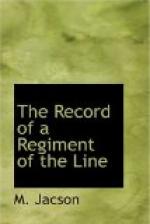The number of patients in the Intombi Hospital Camp had increased by January 10th to—
Over 400 cases of dysentery; " 600 cases of enteric fever; " 200 cases not yet diagnosed, but probably enteric fever; " 800 cases wounded and various.
The daily rations of the garrison now consisted of 1/2 lb. of tinned meat and 1 lb. of bread per man.
Had it not been for the Indian Contingent there would have been no flour at all in Ladysmith. All the flour, all the rum, in fact almost everything that the garrison lived upon with the exception of meat, was brought from India with the Indian Contingent, which carried with it six months’ supply of every description.
From January 12th, another duty assigned to the Regiment was the sending of two companies every morning at two o’clock to the examining guard on the Newcastle road, which was situated just under the 4.7 naval gun “Lady Anne.” They had orders to stop there till 4.30 a.m. to check any rush of Boers into Ladysmith down the Newcastle road. Later on, the ground in front of this post was covered with barbed wire entanglement, but up to this time there was nothing at this point to prevent the Boers galloping right into the town.
[Illustration: A Peaceful Sunday]
[Illustration: Klip River and Camp of the Imperial Light Horse, Ladysmith]
As these two companies went to their places on the 12th, the Boer searchlight on Bulwana was flashing everywhere, and the mountain guns throwing star shell. It looked as if both sides expected an attack. The officer commanding the two companies had orders to operate on the flank of any attack made on the northern defences.
On the following morning the garrison was told that General Buller was moving round by Springfield; in the evening it was given out that he was moving west of Chieveley and Colenso, and was twelve miles from Ladysmith; and on the 14th the news came in that he was at Potgieter’s Drift, and that General Warren was across the Tugela River; and in confirmation of this last information heavy gun fire was heard on the 17th in the direction of Potgieters, and the relieving army’s balloon was seen on the following day in the same direction.
As an attack was expected on the night of the 19th on Observation Hill, three companies of the Regiment under Major Curry proceeded there in the evening and bivouacked, the remainder of the Regiment being under orders to hold themselves in readiness to proceed there at a moment’s notice. The night, however, passed quietly, and the companies returned to their camp before dawn.
On January 20th better news was received from Sir Redvers Buller; his advance had been very satisfactory. Reports stated that he had reached Acton Holmes, and that four brigades had crossed the Tugela. His shells were seen falling thickly on Thabba Nyama mountain.
The tea and sugar rations were, however, cut down to half. The health of the men began now to generally improve, probably owing to better drinking water which was obtainable from the condenser, recently arranged for, at the railway station.




